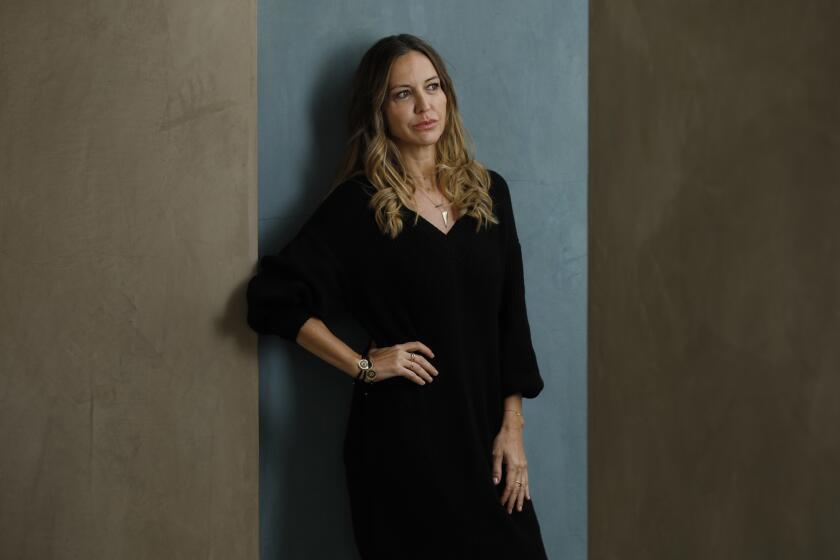#TimesUpGlobes: Celebs call for a more inclusive HFPA amid membership controversy
- Share via
Over the years, it’s practically become Golden Globes tradition to skewer the Hollywood Foreign Press Assn. from the stage of its own awards show.
Hosting in 2016, Ricky Gervais called the event “worthless” and its trophies “a bit of metal that some nice old confused journalists wanted to give you in person so they could meet you and have a selfie with you.” And in 2013, cohosts Tina Fey and Amy Poehler repeatedly confused the HFPA with the sexually transmitted infection HPV: “The HFPA can lead to cervical cancer.”
That tradition continued, albeit in a new light, during Sunday’s virtual ceremony, again emceed by Fey and Poehler.
“The Hollywood Foreign Press Association is made of around 90 international no Black journalists who attend movie junkets each year in search of a better life,” said Fey in the event’s opening monologue. “We say ‘around 90’ because a couple of them might be ghosts, and it’s rumored that the German member is just a sausage that somebody drew a little face on.”
Throughout the monologue, Fey also referred to the group as “European weirdos” and said they positively responded to the Pixar movie “Soul” because they “have five cat members.”
The organization said the perception that many members are not serious journalists is “outdated and unfair” and that it is committed to addressing the lack of Black members.
“This is probably something we should have told you guys earlier: Everybody is understandably upset at the HFPA and their choices,” Poehler later explained. “Look, a lot of flashy garbage got nominated. But that happens — that’s like their thing. But a number of Black actors and Black-led projects were overlooked.”
“And look, we all know that award shows are stupid,” added Fey. “The point is, even with stupid things, inclusivity is important, and there are no Black members of the Hollywood Foreign Press. I realize, HFPA, maybe you guys didn’t get the memo because your workplace is the back booth of a French McDonald’s, but you gotta change that.”
The comments came after a Times investigation of the HFPA raised fresh questions about the ethics, practices and membership of the nonprofit organization, including payments of nearly $2 million to members serving on various committees, nominations for “Emily in Paris” after 30 members took part in a luxe set visit in France and the fact that the 87-member group has no Black members.
Surprisingly, though, the controversy went unmentioned by most of the event’s presenters and winners. “Schitt’s Creek” co-creator and star Dan Levy noted the issue while accepting the award for best comedy/musical series. “This acknowledgment is a lovely vote of confidence in the messages ‘Schitt’s Creek’ has come to stand for — the idea that inclusion can bring about growth and love to a community,” he said. “In the spirit of inclusion, I hope that this time next year, this ceremony reflects the true breadth and diversity of the film and television being made today, because there is so much more to be celebrated.”
Levy accepted his award from “This Is Us” stars Sterling K. Brown and Susan Kelechi Watson, who opened their presentation of the awards for musical/comedy actor and series by saying, “It’s great to be Black — back — at the Golden Globes” in an apparent acknowledgment of the controversy.
“Borat Subsequent Moviefilm” co-writer and star Sacha Baron Cohen also alluded to the diversity woes when he (erroneously) thanked the “all-white Hollywood Foreign Press” in his acceptance speech for best musical/comedy movie. “Donald Trump is contesting the result,” Cohen, who also won the award for comedy/musical actor, added in his second acceptance speech. “He’s claiming that a lot of dead people voted, which is a very rude thing to say about the HFPA.”
Rather than talking about herself and her career, Cecil B. DeMille award recipient Jane Fonda highlighted the power of storytelling — “They can change our hearts and our minds, they can help us see each other in a new light, to have empathy, to recognize that for all our diversity, we are humans first,” she said — and mentioned titles that told diverse stories, including the movies “Nomadland,” “Minari” and “Judas and the Black Messiah,” and TV shows like “Ramy” and “I May Destroy You.”
“Stories, they really can change people,” she said. “But there’s a story we’ve been afraid to see and hear about ourselves in this industry, a story about which voices we respect and elevate, and which we tune out, a story about who is offered a seat at the table and who is kept out of the rooms where decisions are made.
“So let’s all of us, including all the groups that decide who gets hired and what gets made and who wins awards, let’s all of us make an effort to expand that tent so that everyone rises and everyone’s story has a chance to be seen and heard,” she continued.
“I mean, doing this simply means acknowledging what’s true, being in step with the emerging diversity that’s happening because of all those who marched and fought in the past and those who have picked up the baton today. After all, art has always been not just in step with history but has led the way. So let’s be leaders.”
Even before the ceremony began, major Hollywood figures and organizations called for the HFPA to address its diversity shortcomings, including Time’s Up, the Directors Guild of America, directors Ava DuVernay and J.J. Abrams, writer-producer Shonda Rhimes, this year’s Carol Burnett Award recipient Norman Lear and actors Jurnee Smollett, Kerry Washington and Ellen Pompeo, among others. The fallout continued within the HFPA itself.
A Times investigation finds that the nonprofit HFPA regularly issues substantial payments to its members in ways that some experts say could skirt IRS guidelines.
Still, the silence of many of the evening’s presenters and winners on the subject of the HFPA’s diversity went against the grain of recent televised awards shows, which have become prime platforms for those in Hollywood to speak out on various issues and causes. Such speeches — like Patricia Arquette’s discussion of pay equity at the 2015 Oscars and Frances McDormand’s “inclusion rider” mention at the 2018 Oscars — have led to meaningful change in the industry.
While a number of the evening’s winners, like “I Know This Much Is True” star Mark Ruffalo and “The Crown” breakout Josh O’Connor, mentioned the importance of prioritizing climate change and mental health during the pandemic, respectively, Levy and Cohen remained the evening’s only competitive winners to criticize the HFPA in a victory speech.
Early in the telecast, several HFPA members briefly acknowledged the controversy surrounding its lack of Black members. “Tonight, while we celebrate the work of artists from around the globe, we recognize that we have our own work to do,” said Helen Hoehne. “Just like in film and television, Black representation is vital. We must have Black journalists in our organization.”
“We must also ensure everyone from all underrepresented communities gets a seat at our table, and we are going to make that happen,” added Meher Tatna.
“That means creating an environment where diverse membership is the norm, not the exception,” concluded Ali Sar. “Thank you, and we look forward to a more inclusive future.”
More to Read
The complete guide to home viewing
Get Screen Gab for everything about the TV shows and streaming movies everyone’s talking about.
You may occasionally receive promotional content from the Los Angeles Times.









